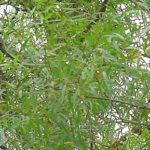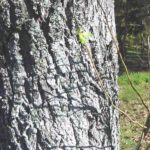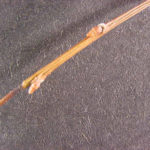black willow (Salix nigra)
Family: Salicaceae
Categories |
Images |
|---|---|
| Form:
This is a small to medium sized tree reaching 35 to 60 ft. in height and 1 to 1 1/2 ft. in dbh. It also has a large bole and a spreading crown. |
|
|
Leaves: Shape: lanceolate Margin: finely serrate Texture: lusterous above and glabrous below Variation: N/A |
|
| Bark:
The bark is nearly black and is deeply furrowed with thick scaly ridges. |
|
| Twigs and Buds:
The twigs are slender and green. The buds are red brown to yellow. |
|
| Flowers and Fruit:
The flowers are found in aments. The fruits is slender and large. |
|
| Distinguishing Characteristics:
This trees leaves have a very short petiole. The twigs are slender and green. The fruit is slender, long, and ovid. The flowers are dioecious. |
|
| Range:
This tree occurs from central Michigan south and east to the Atlantic coast and west to New Mexico. |
|
| Silvics:
This species is very intolerant and occurs on stream banks and low areas. The tree also roots readily from stem cuttings. |
|
| Ecological and Cultural Importance:
This species is the largest and only commercial willow. It is used in making furniture, turnery, doors, and polo balls. White-tailed deer browse twigs and leaves. |


